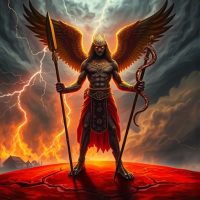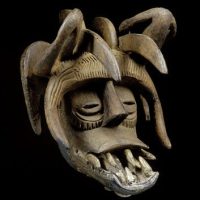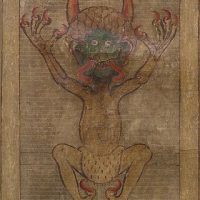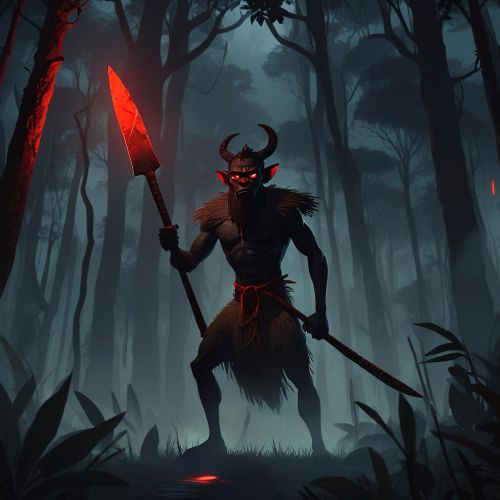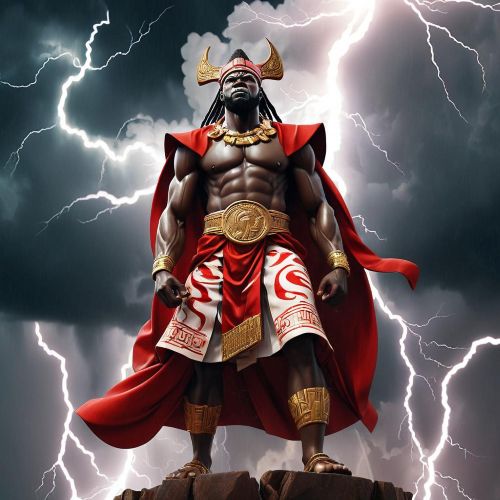Ekwensu : God of War
Listen
At a glance
| Description | |
|---|---|
| Origin | Igbo Mythology |
| Classification | Gods |
| Family Members | N/A |
| Region | Nigeria |
| Associated With | War, Chaos, Trickster |
Ekwensu
Introduction
In Igbo mythology, Ekwensu is one of the most enigmatic and often misunderstood deities. Colonial interpretations and Christian missionaries once portrayed him as the equivalent of the devil, but traditional Igbo cosmology presents a very different picture. Far from being purely malevolent, Ekwensu represents the raw force of change—war, strategy, trade, negotiation, and cunning. He is a spirit of duality who governs both chaos and balance, embodying the Igbo worldview that every force in the universe serves a purpose. Ekwensu challenges stagnation, tests human will, and rewards those who can outwit obstacles through courage and intelligence. His essence is not evil but transformative, representing conflict as a necessary catalyst for growth.
Physical Traits
Ekwensu is not bound to a single physical form, reflecting his nature as a shapeshifter and trickster spirit. In many oral traditions, he appears as a fierce warrior adorned with war paint and armed with spears, radiating both beauty and menace. In other accounts, he manifests as an eagle—a creature symbolizing victory, dominance, and strategic vision. This association with the eagle, often called Ekwensu Ugo (Ekwensu the Eagle), underscores his link to warfare, freedom, and the sharp intelligence required in both battle and trade. His presence is often felt rather than seen—appearing in the cunning decisions of merchants, the bold strategies of generals, and the moments of transformation that disrupt the ordinary. Through his shifting forms, Ekwensu becomes a living symbol of adaptability and the unpredictable nature of power.
Family
In Igbo cosmology, familial relationships among deities are fluid and symbolic rather than fixed lineages. Ekwensu is sometimes described as a son of Chukwu, the supreme god who embodies creation and ultimate order. Within this divine framework, he stands as a counterbalance to deities like Ani (the earth goddess, representing morality and fertility) and Amadioha (the god of thunder and justice). While Ani anchors morality and Amadioha enforces divine order, Ekwensu represents the challenging, chaotic energy that tests both. Some myths also portray him as an independent force rather than a member of any divine family—a self-willed spirit who acts outside the boundaries of the celestial hierarchy. This independence mirrors his role in human affairs: unpredictable, potent, and impossible to fully control.
Other names
Across different Igbo regions, Ekwensu is known by many titles, each emphasizing a different facet of his personality. Names like Onyenwe Ogwu (“Master of Charms”) and Oke Mmuo (“Great Spirit”) highlight his command over mystical forces and spiritual warfare. In the context of trade and negotiation, he is often invoked as Ekwensu N’ahịa—the spirit who governs markets, profit, and persuasion. These titles reveal his duality as both a disruptor and a benefactor. His association with trickery aligns him with other African trickster deities such as Esu in Yoruba mythology and Anansi among the Akan. Unfortunately, during colonial reinterpretations, this complex identity was flattened into a single image of evil, leading to the common but false equation of Ekwensu with Satan. Modern scholars and practitioners of Odinani—the traditional Igbo spiritual system—are working to restore the true understanding of Ekwensu as a deity of balance, not damnation.
Powers and Abilities
Ekwensu’s powers encompass warfare, intellect, and transformation. As the god of war, he grants courage, strategic insight, and endurance to those who call upon him before battle. Yet his domain extends far beyond conflict. In trade and politics, he is the spirit of negotiation and persuasion—the unseen force behind successful deals and bold risks. His trickster nature allows him to blur the lines between order and chaos, teaching mortals that success often requires cunning rather than brute strength. He is a master manipulator of circumstances, able to create confusion or clarity depending on his intent. Ekwensu’s chaos, however, is never meaningless—it is the kind that pushes humanity forward. He tears down old systems so that new ones can rise, just as storms clear the air for renewal. His energy reminds the Igbo that wisdom is born from struggle, and balance can only exist when both calm and chaos are understood.
Modern Day Influence
In contemporary Igbo society and across the African diaspora, Ekwensu’s image is being reexamined and revitalized. After centuries of colonial distortion, a cultural and spiritual revival is reclaiming him as a symbol of empowerment, intelligence, and resilience. Artists, musicians, and writers have begun to reinterpret Ekwensu in modern contexts—portraying him not as a devilish figure but as a metaphor for rebellion against oppression and for the courage to challenge authority. Nigerian authors have referenced him in literature as a force of liberation and as the embodiment of the human spirit’s defiance in the face of adversity. Within spiritual communities practicing Odinani, rituals honoring Ekwensu are returning, emphasizing his role as a necessary energy that brings renewal through disruption.
Globally, in Afro-diasporic movements, Ekwensu resonates with people reconnecting to indigenous African spirituality. His story serves as a reminder of how colonialism distorted native beliefs and how reclaiming these narratives restores cultural identity. Scholars of comparative mythology also study Ekwensu alongside global trickster archetypes—figures like Loki, Hermes, or Coyote—highlighting his function as a mediator between worlds, order and chaos, human and divine. In this light, Ekwensu’s enduring presence continues to evolve, reflecting humanity’s perpetual struggle with ambition, morality, and transformation.
Related Images
Source
Achebe, C. (1993). Things Fall Apart. New York: Doubleday.
Anenechukwu Umeh, J. (2025). Ekwensu! The Mighty Agbara of Wealth & War in Igbo Spirituality. Retrieved from https://sloaneangelou.blog/journal/notes-on-ekwensu-agabara-of-wealth-amp-war-in-igbo-spirituality
Kanu, A. (n.d.). Igbo-African Gods and Goddesses [PDF]. Retrieved from https://www.ikechukwuanthonykanu.com/repo/IGBO%20GODS%20AND%20GODDESES.pdf
Metuh, E. I. (1981). The Hellenization of African Traditional Deities. Journal of African Studies.
Opata, D. U. (2005). Ekwensu In the Igbo Imagination: A Heroic Deity Or Christian Devil. Nsukka, Nigeria: Great AP Express.
Wikipedia contributors. (2006). Ekwensu. Wikipedia. Retrieved from https://en.wikipedia.org/wiki/Ekwensu
Aron Helps. (2024, October 7). Ekwensu- The Igbo Deity of War and Victory. Retrieved from https://aronhelps.com/ekwensu-the-igbo-deity-of-war-and-victory/
Academic Journal. (2022). IGWEBUIKE: An African Journal of Arts and Humanities, Vol. 8, No. 1. Retrieved from https://www.igwebuikeresearchinstitute.org/journal/IGWEBUIKE%20JOURNAL_8_1_9.pdf
Umeh, J. A. (1999). After God is Dibia: Igbo Cosmology, Divination & Sacred Science in Nigeria. Karnak House.
Okafor, C. (2006). Igbo Philosophy of Law. University of Nigeria Press.
Nwoye, G. (2011). Igbo Cultural and Religious Worldview: An Insider’s Perspective. International Journal of Sociology and Anthropology, 3(9), 304–317.
Ilogu, E. (1974). Christianity and Igbo Culture. NOK Publishers.
Frequently Asked Questions
What is lorem Ipsum?
I am text block. Click edit button to change this text. Lorem ipsum dolor sit amet, consectetur adipiscing elit. Ut elit tellus, luctus nec ullamcorper mattis, pulvinar dapibus leo.
What is lorem Ipsum?
I am text block. Click edit button to change this text. Lorem ipsum dolor sit amet, consectetur adipiscing elit. Ut elit tellus, luctus nec ullamcorper mattis, pulvinar dapibus leo.
What is lorem Ipsum?
I am text block. Click edit button to change this text. Lorem ipsum dolor sit amet, consectetur adipiscing elit. Ut elit tellus, luctus nec ullamcorper mattis, pulvinar dapibus leo.
What is lorem Ipsum?
I am text block. Click edit button to change this text. Lorem ipsum dolor sit amet, consectetur adipiscing elit. Ut elit tellus, luctus nec ullamcorper mattis, pulvinar dapibus leo.
What is lorem Ipsum?
I am text block. Click edit button to change this text. Lorem ipsum dolor sit amet, consectetur adipiscing elit. Ut elit tellus, luctus nec ullamcorper mattis, pulvinar dapibus leo.


